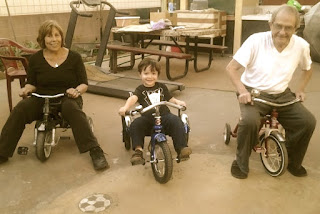What is Hispanic Marketing Nowadays?
The
Latino community in the U.S. is more diverse than ever. Take my niece Nicole who
was born in the U.S. but is bicultural and bilingual. Throw her in a room full of Latinos and she
is able to hold her own with all the jokes and innuendos, not to mention the
music and dancing. Put her in a room full of Non-Hispanics and she’s just as
comfortable and in her element. While she listens to some Spanish-language
music, almost all of her media consumption is in English. My nephew Bryan, on
the other hand, who was also born in the U.S., has gone through great lengths
to retro-acculturate with his Hispanic roots. He proudly wears the colors of
his motherland flag, speaks Spanish perfectly, follows his fútbol team
religiously, drinks ‘mate’ every day, and consumes hours of Spanish language
media from here and there.
So
what is Hispanic marketing nowadays with such diversity within our own
community? This question sometimes keeps me up at night because it’s what I do
for a living. I wonder sometimes if it would be easier to switch to the general
market side of marketing, you see Hispanics come in all shapes, sizes, colors, and
accents.
Add
to that mix, different language preferences, different acculturation levels,
U.S. born vs. foreign born, media consumption in different languages, and the
whole thing becomes rather complex. And to make matters even more challenging, Hispanic
families in the U.S are becoming more culturally diverse as many younger
generations are born in the U.S.
Then
there’s the fact that the majority of Hispanics nowadays consider themselves to
be bicultural – or in other words, living in both worlds. So in essence, they
are viewing everything through the lens of two cultures. Two sets of perspectives
with which to interpret messaging, behaviors, actions, and needs…yikes! Get my
drift? This is enough to drive any marketer crazy. Oftentimes, I’m invited to attend total market
focus groups and this is really great for understanding Hispanics’ “American” point
of view, but often what is missing is their Latino POV.
So
being a strategic planner for the U.S. Hispanic market requires looking at my
consumer audience from various angles, using a Latino and U.S. mainstream lens.
Our strategies must be as dynamic as they are because we know all too well that
a one-size approach does not work. I aim
to take a bicultural approach in my strategies, because that’s what we do in
life, that’s how we live everyday.
Throughout the course of one day for example, I switch back and forth
many times between my Latina self and my American self. Even my 11-year old
son, who is 3rd generation embraces that reality and has flexibility
of thought just from being bicultural.
This was evident recently at a swim
meet. My son was hanging with about five of his teammates in between races
listening to Drake, and the only other Latino kid in the group was eating an
empanada. At one point, they looked at each other, and my son asked him, in
Spanish, ¿es de carne? The other kid responded ‘si’ and my son said “mmmm, esas
son las mejores.” They both smiled knowingly at each other, knowing that only
they understood this exchange, and that’s when I knew my son understood his own
bicultural identity.
It’s that sentiment, that knowing look, that subtle
understanding that I strive to achieve in my Hispanic communication strategies.




Comments
Post a Comment